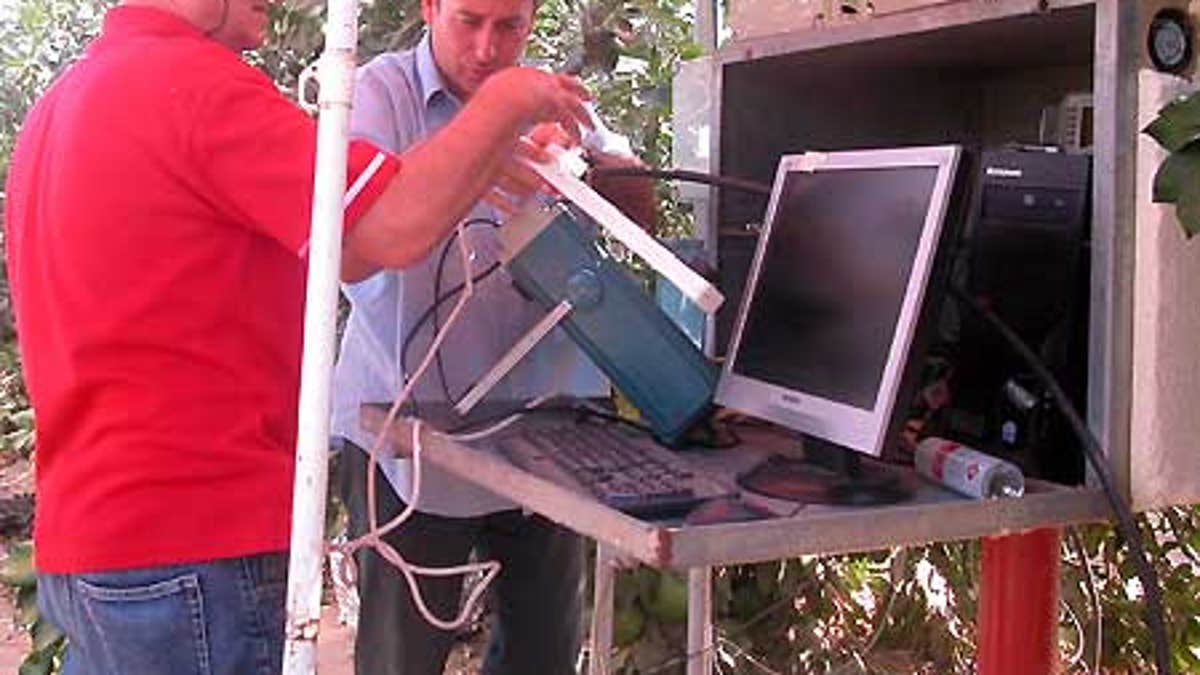
Dr. Eran Raveh spent seven years perfecting the hammer-shaped sensor that gauges moisture levels in plants and trees.
May I have your attention, please? This is your pachysandra calling. I'm thirsty.
As if we're not getting enough electronic stimulation already, a new device enables plants to send a text message when they need a drink.
A sensor developed by Israeli scientists sends text messages to farmers when crops need water, or to homeowners when the Ficus is thirsty. It is currently being prepped for international commercial markets.
Israel Agricultural Ministry plant physiologist Dr. Eran Raveh and his earth-scientist partner Dr. Arie Nadler spent seven years perfecting the hammer-shaped sensor that gauges moisture levels in plants and trees and sends real-time alerts to mobile phones or computers when water levels are low.
"The idea behind creating the sensor was to cut irrigation costs by up to 50 percent," Raveh told Fox News.
• Click here to visit FOXNews.com's Natural Science Center.
• Click here for FOXNews.com's Patents and Innovation Center.
According to Raveh, farmers are Israel's No. 1 water consumers. The sensor helps cut water usage and avoid unnecessary and damaging over-irrigation by providing accurate water-level feedback.
"With this sensor, the level of irrigation, and primarily its timing, will be controlled by the farmers themselves," Nadler said.
According to the scientists, farmers check no fewer than 26 points in soil surrounding a plant to monitor and gauge moisture levels.
The sensor, operating on an electrical conductivity principal, continuously measures and collects water-level data via a series of metallic nails inserted into plant stems.
When water levels drop, electric activity halts, and a text message or e-mail automatically goes out to the someone who can turn on the spigot.
The notification mode works on a wireless principal similar to walkie-talkie communication. Sensors placed in an orchard or nursery are connected to a central device within a home or nerve center in a grove, and from that point, messages are transferred out to the end user's mobile phone or computer.
"What's great about our sensor is that it's highly accurate without being prohibitively expensive," Raveh explains.
At $250 for a 5,000-tree orchard — versus $12,000 for a similar high-tech probe — the Israeli scientists say price and accuracy set them apart.
Domestic consumers are eager to try out the sensor, saying it will be a welcome addition in the home.
"I would totally love this!" said TV producer Joyce Boll, who travels frequently between the Middle East, New York, South America and Europe and is a self-proclaimed "big gardener" who has had some not-so-great experiences with plants and gardens perishing while she is away from home.
"I was gone once for six weeks and came home to find out that the guy taking care of my greens didn't do such a hot job. A lot of my plants died," Boll relays. "So if I or the caretaker could get a text message when it's time for watering ... Wow. Totally great."
Major-market agriculturalists are also eyeing the gadget for future implementation. Raveh and Nadler say they have received positive nods from Delano, Calif.-based Paramount Citrus, and California vintners have also expressed interest in the model when it goes to market.
"There is certainly interest in this proposed methodology," Dr. Donald Suarez, director of the USDA Agricultural Research Salinity Laboratory in Riverside, Calif., told Fox News. "The technology in general of measuring stem flow is emerging, and it hasn't been widely adopted by farmers or growers yet."
But with the combined incentives of reduced cost and hi-tech notification systems, the Israeli scientists are looking to find mass appeal.
"I guess for people who travel, it's good. They'll certainly return to find the plants just as happy as when they left — especially if they combine the sensor alert with a timed-drip irrigation system," Raveh concluded, referring to Israeli-invented irrigation technology.
